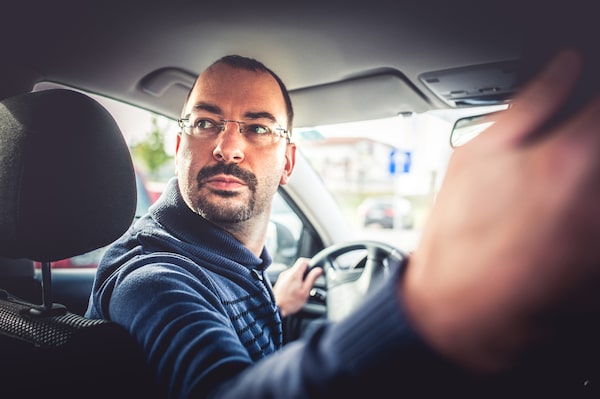More and more, I see cars racing past cars with their back-up lights on and in the middle of reversing from parking spots and driveways. I was always taught (ahem, 30 years ago) to let them out because they might not be able to see you. At 46, am I a dinosaur? — Dave

In a kinder, slower world, other cars would stop and wait for you to back up. But don’t expect them to.CasarsaGuru/iStockPhoto / Getty Images
In a kinder, slower world, other cars would stop and wait for you to back up. But don’t expect them to.
“Back when kindergarten taught people to treat others the way you wanted to be treated, it was the convention that if somebody needed a bit of help or was performing a tricky maneuver, everyone would slow down,” said Angelo Di Cicco, director of operations at Young Drivers of Canada’s advanced driving centre. “But now, there are more people are on the road and people’s attention is being eaten up by electronic devices — stuff that’s in your car, things that are talking to you and asking you things.”
People might not even notice that your back up lights are on. Or they might think you look like a lousy driver and will take too long, Di Cicco said. Whatever the reason, you have to watch out for them — and assume they won’t stop.
We checked with a few police forces across Canada. They all said that if you’re backing out, the onus is on you — and not everybody else — to make sure it’s safe.
“There’s no obligation for [other drivers] to slow down,” said Sgt. Kerry Schmidt, with Ontario Provincial Police highway safety division. “Your back-up lights aren’t a signal, they’re there so you can see backing up.”
Reversal of misfortune?
And although other drivers “don’t have to do anything to help the reversing driver, we would like to think people do,” said Sgt. Brett Moore, with Toronto police traffic services, in an e-mail.
For insurance purposes, you’d likely be considered at fault if somebody hits you. That said, if the other driver was speeding or otherwise driving dangerously, there could be charges against them — and, you might be off the hook.
“Let’s say there’s a big crash caused by somebody speeding, the person backing up might not be at fault — police would have to do an investigation,” said Capt. Paul Leduc, Sûreté du Québec spokesman. “There could be a charge of reckless driving. It’s a $1,000 fine — but that’s rare.”
In Ontario, the HTA doesn’t apply on private property, but, in most other places, it does. But unless there’s an accident or something “egregious,” the chances of anyone getting a ticket are slim.
“Police would rarely if ever conduct enforcement in a parking lot because it is private property,” said Sgt. Jason Robillard, Vancouver police spokesman, in an e-mail.
Back in, instead
When you are backing out, put on your turn signal so people know which way you’re going, Di Cicco said. And, if you want to make sure people know you’re backing out, consider turning on your four-way flashers — or giving other drivers a few short taps on the horn.
If you have a back-up monitor, consider looking at the display — instead of just looking behind you — while you’re backing up.
“At least reference it, because the camera is closer to the rear end of the car than you are,” Di Cicco said.
And, once you shift into reverse, don’t sit there with your foot on the brake while you text, put on chapstick or sip coffee.
“You’re communicating with that back-up light, so don’t lie to people,” Di Cicco said. “You start confusing people — and the people who would have slowed down for you will get pissed off.”
Better yet, avoid backing into parking stalls at all. Either back in, or find two spaces where you can drive through one and park in the second one.
“That way, you can drive out — the visibility is better and you can make eye-to-eye contact with the other driver,” Di Cicco said. “You can shame them into slowing down.”
Have a driving question? Send it to globedrive@globeandmail.com. Canada’s a big place, so let us know where you are so we can find the answer for your city and province.
Stay on top of all our Drive stories. We have a Drive newsletter covering car reviews, innovative new cars and the ups and downs of everyday driving. Sign up for the weekly Drive newsletter, delivered to your inbox for free. Follow us on Instagram, @globedrive.